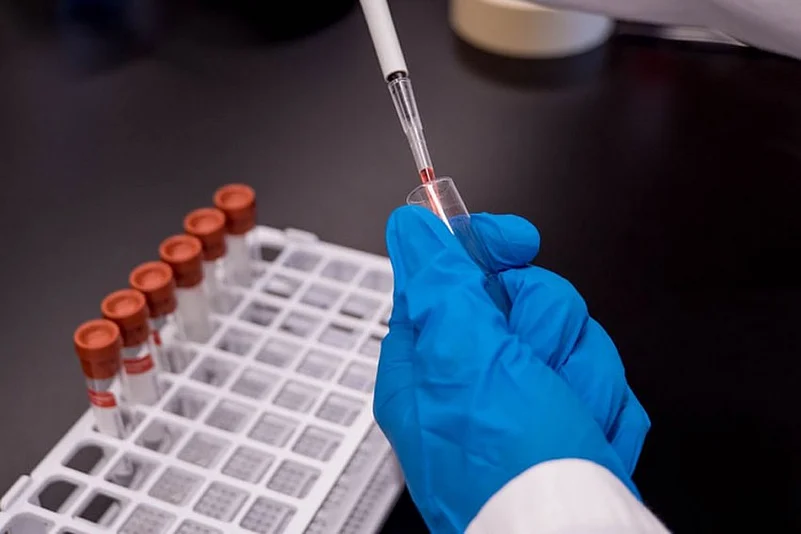Using cholesterol-lowering drugs called statins is associated with a lower death rate in patients hospitalised with Covid-19, according to a large-scale study.
The research, published in the journal Cell Metabolism, also showed that mortality risk and other negative outcomes were not increased by combination therapy consisting of statins and blood pressure-lowering drugs called angiotensin-converting enzyme (ACE) inhibitors and angiotensin II receptor blockers (ARBs).
"These results support the safety and potential benefits of statin therapy in hospitalised patients with Covid-19 and provide a rationale for prospective studies to determine whether statins confer protection against Covid-19-associated mortality," said study senior author Hongliang Li of Wuhan University in China.
"Moreover, our findings represent an important contribution to the accumulating clinical evidence regarding the beneficial or detrimental effects of prescribing ACE inhibitors or ARBs to patients with Covid-19," Li said.
Currently, there is no vaccine or specific antiviral drug approved to prevent or treat severe acute respiratory syndrome coronavirus 2 (SARS-CoV-2) infection, which causes Covid-19, the researchers noted.
Because a vaccine or drugs for Covid-19 will likely not be available for months or even years, repurposing clinically approved therapies might be a more attractive option, they said.
According to the researchers, statins may serve such a purpose because these drugs slow the progression of lung injury in animals, improve immune cell responses, and strongly reduce inflammation, which is likely responsible for severe Covid-19 complications such as organ damage.
Although statins generally have an excellent safety profile in humans, animal studies have shown that they increase the expression of ACE2 -- the receptor that SARS-CoV-2 binds to and uses to enter host cells, they said.
Animal studies have also shown that ACE2 protects organs such as the lungs against virus-induced injury, the researchers explained.
It has not been clear how clinical outcomes in patients with Covid-19 are affected by the use of statins, either alone or in combination with ACE inhibitors and ARBs, which are commonly prescribed with statins and also increase ACE2 expression in animals, they said.
The researchers carried out a retrospective study of 13,981 Covid-19 patients admitted to 21 hospitals in Hubei Province, China.
Among these patients, 1,219 used statins, primarily atorvastatin at an average dose of 20 mg/day.
Among patients with hypertension or high blood pressure, 319 used statins combined with ACE inhibitors or ARBs, and 603 used statins combined with other antihypertensive drugs.
The researchers analysed mortality rates and secondary outcomes, including the incidence of invasive mechanical ventilation, admission to intensive care units, acute respiratory distress syndrome, and liver, kidney, or heart injury.
Over a 28-day follow-up period, statin use was associated with a lower death rate and a lower incidence of mechanical ventilation, the study found.
Statin use was associated with 5.5 per cent mortality rate, compared to 6.8 per cent without statin use, representing a 19 per cent decrease, they said.
When the researchers examined the matched cohort of 861 patients in the statin group and 3,444 patients in the non-statin group, statin use was associated with a 45 per cent decrease in the mortality rate, from 9.4 per cent to 5.2 per cent.
In the matched cases, statin use was also associated with lower levels of three inflammation biomarkers, and a lower incidence of acute respiratory distress syndrome and admission to intensive care units, the researchers said.
In the unmatched sample, mortality and secondary outcomes over 28 days were not affected by the use of statins combined with ACE inhibitors or ARBs, compared to combination therapy consisting of statins and other antihypertensive drugs.
However, in the matched cohort with 204 patients in each group, the use of statins combined with ACE inhibitors or ARBs versus other antihypertensive drugs was associated with a 65 per cent drop in the death rate, and a lower incidence of heart injury and acute respiratory distress syndrome.
However, the study does not prove that the lower death rate of patients with Covid-19 is directly caused by the use of statins, either alone or in combination with ACE inhibitors or ARBs, the researchers said.
Researchers said it is also unclear whether the findings apply to non-hospitalised patients with Covid-19, adding that the results of retrospective studies should be interpreted with caution.

























